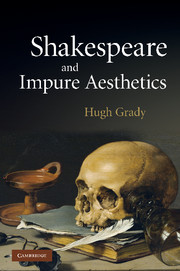Book contents
Conclusion: the critical present
Published online by Cambridge University Press: 11 March 2010
Summary
What was once true in an artwork and then disclaimed by history is only able to disclose itself again when the conditions have changed on whose account that truth was invalidated: Aesthetic truth content and history are that deeply meshed … Tradition is to be not abstractly negated but criticized without naïveté according to the current situation: thus the present constitutes the past. Nothing is to be accepted unexamined just because it is available and was once held valuable; nor is anything to be dismissed because it belongs to the past.
Theodor AdornoWalter Benjamin's Kabbalistic idea of double hermeneutics – part oriented to the past under the aegis of the Tree of Knowledge, part oriented to the future, under the aegis of the Tree of Life (see above, Chapter 4) – can also provide us with a way of thinking about the situation of the theory of impure aesthetics argued here. Benjamin saw interpretation as always involving two contradictory but unified impulses. I want to conclude this book with a similar strategy.
- Type
- Chapter
- Information
- Shakespeare and Impure Aesthetics , pp. 225 - 239Publisher: Cambridge University PressPrint publication year: 2009



